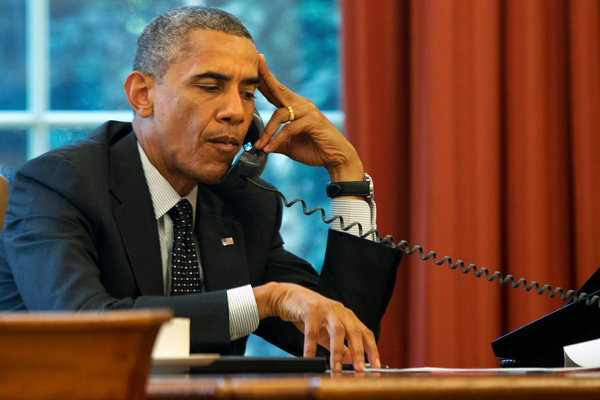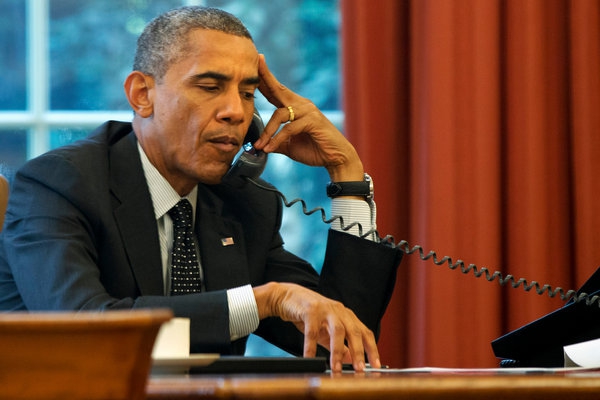 President Obama said on Friday that Iraqs leaders must form an inclusive government in order to pull the country together.
President Obama said on Friday that Iraqs leaders must form an inclusive government in order to pull the country together.JACQUELYN MARTIN / ASSOCIATED PRESS[/caption]
WASHINGTON President Obama said Friday that he was open to supporting a sustained effort to drive Sunni militants out of Iraq if Iraqi leaders form a more inclusive government, even as he vowed that the United States had no intention of being the Iraqi air force.
Mr. Obama spoke as he ordered American fighter pilots back into the skies over Iraq, a decision that he said he reached after concluding that the United States needed to protect the Kurdish regions in the north and bolster an Iraqi leadership that was panicked in the face of advances by the Islamic State in Iraq and Syria.
The president said he was confident that the Iraqi leaders understand that the cavalry is not coming to the rescue with ground forces. But he insisted that the United States has a strategic interest in pushing back ISIS, suggesting a potentially broader mission than the one he described in Thursdays White House address: to protect American personnel and prevent mass killings of religious minorities.
Were not going to let them create some caliphate through Syria and Iraq, the president said in an hourlong interview with Thomas L. Friedman, a New York Times columnist, as American planes and drones began dropping bombs in Iraq. But we can only do that if we know
Lawmakers offered tempered support for the presidents actions in Iraq, but he also drew criticism from Republicans and Democrats for a mission that some called too limited and others worried would draw the United States more deeply back into Iraq.
Mr. Obama offered his justifications for his latest use of military force in Iraq while lamenting the outcome of a similar decision he made to intervene militarily in Libya in 2011. He defended the desire to help oust the Libyan dictator, Col. Muammar el-Qaddafi, with American air power, but he acknowledged that he had underestimated the chaos that would follow after American forces left.
So thats a lesson that I now apply every time I ask the question, Should we intervene militarily? Mr. Obama said. Do we have an answer the day after?
In the case of the current fighting in Iraq, he suggested that the outcome would be different than chaos in Libya because efforts to form a government that could help rebuild Iraqi society are moving forward, albeit haltingly.

Interactive Graphic | A Rogue State Along Two Rivers The victories gained by the militant group calling itself the Islamic State in Iraq and Syria were built on months of maneuvering along the Tigris and Euphrates Rivers, which define a region known as the cradle of civilization.
Theyve now elected a president, theyve elected a speaker of the house, Mr. Obama said. The final step is to elect a prime minister and to allow that prime minister to form a government. He added that Iraqis are recognizing that they have to make accommodations in order to hold the country together.
A day before leaving for a two-week vacation with his family on Marthas Vineyard, Mr. Obama discussed many of the most vexing problems that his administration is confronting on the world stage.
In the Middle East, where fighting began Friday morning as a 72-hour cease-fire between Israel and Hamas expired, Mr. Obama said that neither Israels prime minister, Benjamin Netanyahu, known as Bibi, nor the Palestinian Authoritys president, Mahmoud Abbas, have the political will to come to terms on a lasting peace agreement.
In some ways Bibis too strong, in some ways Abbas is too weak to bring them together and make the kind of bold decisions that a Sadat or a Begin or a Rabin were willing to make, Mr. Obama said, referring to Anwar el-Sadat, the former president of Egypt, and Menachem Begin and Yitzhak Rabin, two previous Israeli prime ministers.
Video | Obama on Iraqi Airstrikes and Airdrops President Obama spoke about actions taken by his administration in Iraq, including airdrops of humanitarian supplies and the authorization of airstrikes against ISIS forces.
The president said his own ability to broker a peace deal was limited by the lack of desire on the part of Israeli and Palestinian leaders. You can lead folks to water, theyve got to drink, Mr. Obama said. And so far at least, they havent been willing.
The president rejected criticism that the military advances by ISIS in Iraq could have been prevented if he had been willing months ago to provide heavy armaments to the Syrian rebels who were fighting against ISIS and the forces of President Bashar al-Assad in that country.
Its always been a fantasy, he said, this idea that we could provide some light arms or even more sophisticated arms to what was essentially an opposition made up of former doctors, farmers, pharmacists and so forth.
Mr. Obama, hinting at some strain from the summers international crises, said the prospects for a diplomatic agreement that would prevent President Vladimir V. Putin of Russia from invading Ukraine were real, but dimming.
Video | The Pesh Mergas Fight Against ISIS A look at who the pesh merga are, their history as Iraqs most formidable force, and why President Obama has now authorized airstrikes against ISIS to support them.
A deal should be possible, Mr. Obama said. However, he added, we are at a dangerous time, in part because the position of the separatists has weakened. I think Putin does not want to lose face, and so the window for arriving at that compromise continues to narrow.
He could invade, Mr. Obama said.
On Iran, the president said the chance that American efforts to strike a deal on nuclear weapons is a little less than 50-50, in part because some Islamic leaders may fear such a pact would loosen their grip on power.
That may prevent us from getting a deal done, Mr. Obama said. It is there to be had. Whether ultimately Iran can seize that opportunity we will have to wait and see, but it is not for lack of trying on our part.
Some of the criticism of Mr. Obamas Iraq announcement came from his own party. Democrats and the antiwar groups that make up a crucial part of their political base said they were concerned about mission creep, cautioning that their opposition to committing ground forces in Iraq was resolute.
I hope and I have to believe the president when he said that it is limited and strictly for the purpose of protecting U.S. personnel and a humanitarian mission to prevent genocide, Representative Barbara Lee, a California Democrat who is one of the partys leading antiwar voices on Capitol Hill, said in an interview. My concern is for mission creep and escalation into a larger military conflict. The American people dont have the appetite for sending combat troops and engaging in another war in Iraq.
At the same time, some Republicans suggested that the president had acted too slowly and timidly to confront ISIS, and now was moving too cautiously against the group.
If this is the beginning of a real effort to push back ISIS and destroy them, then I definitely support that, said Representative Adam Kinzinger, Republican of Illinois, an Air Force veteran and Air National Guardsman who sits on the Foreign Affairs Committee. Unfortunately, he did not have the intensity to come out and say that we have to destroy them. I think the president is frightened of re-engaging in Iraq, and I dont think he really knows how to sell the reality of re-engaging to the American people.
Senator Saxby Chambliss, a Georgia Republican on the Armed Services and Intelligence Committees, said he told Mr. Obama last week that he did not believe he was acting aggressively enough to counter the threat from ISIS.
Its important that we do carry out some strong military missions inside of Iraq, he said. He added that it was important to let ISIS know were here in support of our people, and we are not Malikis air force, but we are going to protect the Iraqi people, referring to Nuri Kamal al-Maliki, the prime minister of Iraq. His advisers were glad to know that there are some of us out there who are willing to stand behind the president.
By The New York Times
The Iran Project is not responsible for the content of quoted articles.











